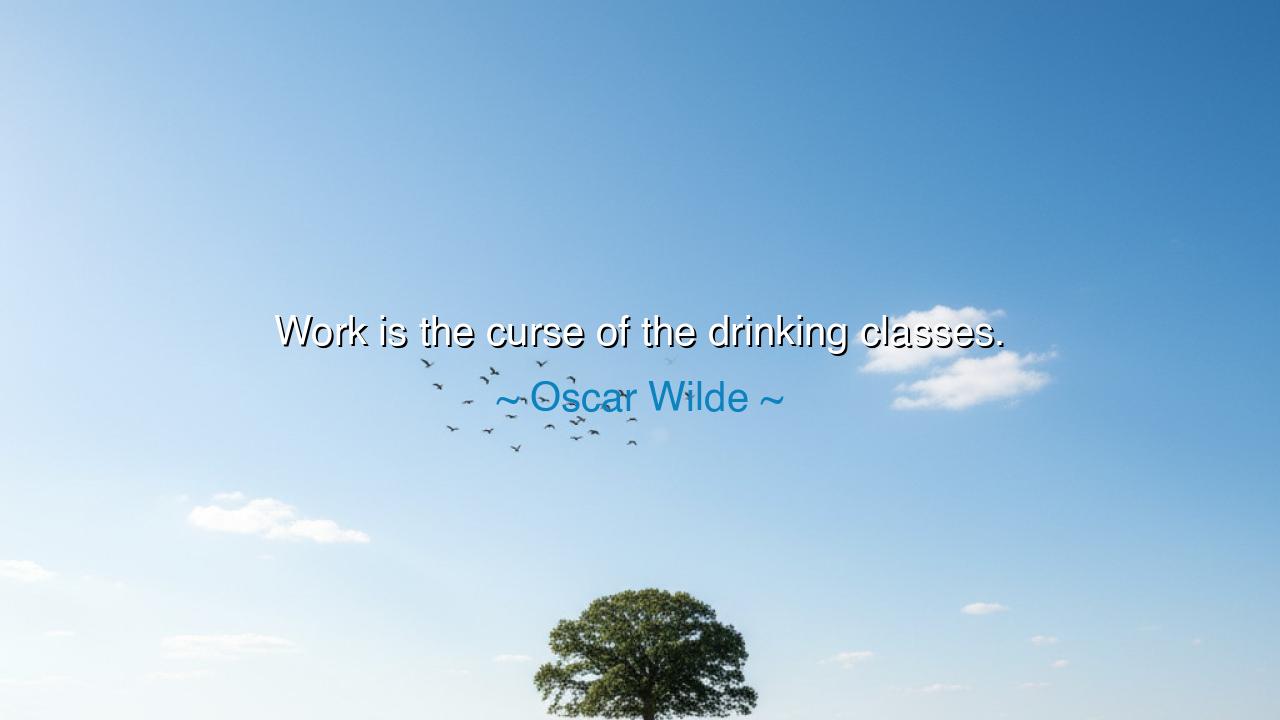
Work is the curse of the drinking classes.






The saying of Oscar Wilde — “Work is the curse of the drinking classes” — resounds like a jest, yet behind the laughter lies a blade of truth. Wilde, master of wit, unmasked society with words that seemed light, but cut deep. He saw that while men and women sought joy in fellowship, song, and wine, the weight of endless toil pressed them down, robbing them of the very delight that makes existence worth enduring.
In the tongue of the ancients, one might declare that work, meant to dignify humanity, had instead become a chain, binding spirit and body alike. Once, labor was a sacred act — tilling the earth, shaping stone, crafting goods that sustained life. But in Wilde’s time, and even in ours, labor became drudgery, a force that consumes the soul’s brightness. Thus, he named it not a blessing, but a curse, laid heavy upon those who sought release in drink, laughter, and fleeting freedom.
The phrase “drinking classes” was not meant in scorn but in irony. It was Wilde’s way of mocking the division between the wealthy, who enjoyed leisure without toil, and the working poor, who found brief salvation in the cup. To drink was not merely to escape, but to reclaim — if only for an hour — a kingdom of the self, unshackled from duty. In this way, Wilde elevated the reveler, showing that their thirst was not weakness but protest, their merriment not folly but rebellion.
Yet let us hear, beneath the jest, a warning: when work devours life, when duty eclipses joy, then humanity loses its essence. Wilde reminds us that to live is not merely to labor, but to savor — to laugh, to dream, to feast with friends. His paradoxical wit calls us to remember that true wealth is measured not in coins earned, but in moments lived.
So let these words endure as counsel to future generations: do not let work become your master. Let it serve you, but do not bow wholly to its demands. For life is brief, and its sweetest nectar lies not in endless striving, but in the balance of labor and leisure, of bread and wine, of burden and song. Wilde’s jest, like the wisdom of the ancients, is both laughter and law: that joy, once lost, is the greatest curse of all.






BHPhan Khac Bao Hieu
This quote strikes me as both playful and cynical. Wilde often used humor to critique society, and here it seems like he’s mocking the notion that work is an unavoidable and burdensome part of life. Could it be that Wilde is expressing a deeper truth—that sometimes our work obligations become an obstacle to experiencing joy, or is he merely poking fun at the notion of work itself?
TVThuy Vy
Wilde’s remark brings to mind the tension between ambition and pleasure. Is it really work that’s the problem, or is it our attitude toward it? Perhaps Wilde is pointing out the irony of people who work hard yet yearn for freedom and enjoyment. This idea challenges us to think: does a demanding job strip us of our ability to enjoy life’s simpler pleasures?
MPbui thi minh phung
This quote is intriguing because it flips the conventional view of work. Typically, work is seen as a virtue or necessity, but Wilde seems to suggest that it’s a burden, especially for those who prefer a more indulgent lifestyle. Does this imply that excessive focus on work suppresses life’s enjoyment? How does the balance between work and leisure impact our well-being?
KVPham Thi Kieu Van
Oscar Wilde’s quote seems to satirize the idea of work, especially in relation to those who indulge in drinking. It highlights a contrast between labor and leisure, suggesting that work interferes with the carefree pleasures of life. But, is this quote merely a critique of the working class, or is it a reflection of the existential struggle between work and personal fulfillment?